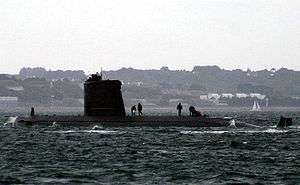Agosta-class submarine
 French submarine Ouessant at Brest in 2005 | |
| Class overview | |
|---|---|
| Operators: | |
| Preceded by: | Daphné class |
| Succeeded by: | |
| Subclasses: | Agosta 90B |
| In commission: | 1977 – Active in service in Spain and Pakistan |
| General characteristics | |
| Displacement: |
|
| Length: |
|
| Beam: | 6 m (19 ft 8 in) |
| Speed: | |
| Range: | 8,500 miles (13,679 km) |
| Test depth: |
|
| Complement: |
|
| Sensors and processing systems: |
|
| Armament: |
|
The Agosta-class submarine is actually two related class of diesel-electric and fast attack submarine developed and constructed by France's DCNS to succeed the Daphné submarines. The French Navy grouped this model of submarine in their most capable class as an océanique, meaning "ocean-going."[1] The Agosta–70 are in the active service with the Spanish Navy, Pakistan Navy, and formerly by the French Navy when they commissioned the Scorpène class submarines.
The Agosta-90B is a modernized version that is built as part of a joint-venture by Pakistan's KSEW and the France's DCNS for Pakistan Navy and features the air-independent marine propulsion. The Agosta-90B are slightly larger and modified submarine that has a crew of 36 plus 5 officers and can be equipped with the MESMA air-independent propulsion (AIP) system.
Ships
French Navy
built by Arsenal de Cherbourg
- Agosta (S 620) – completed 1977 – decommissioned 1997
- Bévéziers (S 621) – completed 1977 – decommissioned 1998
- La Praya (S 622) – completed 1978 – decommissioned 2000
- Ouessant (S 623) – completed 1978 – decommissioned 2001
Spanish Navy
built by Cartagena dockyard
- Galerna (S 71) – completed 1983 – in service
- Siroco (S 72) – completed 1983 – decommissioned 2012
- Mistral (S 73) – completed 1985 – in service
- Tramontana (S 74) – completed 1985 – in service
Pakistan Navy
In 1977, Pakistan acquired two Agosta–70 class submarine from France that were originally designed for the South African Navy but France cancelled the delivery following the implementation of Resolution 418 (an arms embargo) by the United Nations.[2] Built and designed by the AC Dubigeon, France eventually sold the Agosta-70 submarines to Pakistan Navy in 1979.:155[3]
- PNS/M Hashmat (S135) – completed in 1979, originally named Astrant
- PNS/M Hurmat (S136) – completed in 1980, originally named Adventurous
The Agosta–90B class submarines also known as the Khalid–class, is a modernized and long–range air-independent powered submarines designed and developed through a joint venture between the French DCNS and Pakistan's KSEW Ltd.[1]
The submarines were built through the technology transfer by France to Pakistan that resulted in complicated and lengthy negotiations between the Benazir administration and the Chirac administration in 1990s.[4] The Agosta–90Bs were chosen over the British Upholder/Victoria-class and the project was initially aimed at $520 million[5] but the programme of technology transfer costed $950 million, for which France first provided loans that were paid in five to six years.:162[6][5]
In 2000, France gave Pakistan the licence to offer commercial production of the submarines to potential customers. However, Pakistan Navy remains the only customer, partly due to export restrictions imposed by Pakistan itself.[7] About the commissioning of the submarine, Chief of Naval Staff Admiral Abdul Aziz Mirza reportedly quoted, "Pakistan Navy today joins the elite club of a very few countries which have the ability to build submarines".[8]
Various modifications give lower acoustic signature, increased diving depth, improved battery range and performance. Greater automation control also allows the crew to be reduced from 54 to 36. Agosta–90B is capable of carrying a combined and armed up to 16 torpedoes, SM39 Exocet, and seaborne cruise missiles.[9] The SM39 was test-fired from a Khalid-class submarine in 2001.[10]
- PNS/M Khalid (S137) – built in France by DCN Cherbourg, completed in 1999
- PNS/M Saad (S138) – built in Pakistan with French assistance, completed in 2002
- PNS/M Hamza (S139) – built in Pakistan, commissioned 14 August 2006
In 2017, the Agosta–90B Khalid became the first submarine in the Navy to launch a nuclear-capable missile when it test fired the Babur, providing Pakistan with an offshore nuclear second strike capability.[11][12][13]
See also
References
- 1 2 Shabbir, Usman. "Agosta 90B « PakDef Military Consortium". pakdef.org. « PakDef Military Consortium. Retrieved 12 January 2017.
- ↑ NTI, Nuclear Threat Initiatives staffer. "Pakistan Submarine Capabilities". www.nti.org. Nuclear Threat Initiatives. Retrieved 12 January 2017.
- ↑ Goldrick, James (1995). No Easy Answers: The Development of the Navies of India, Pakistan, Bangladesh, and Sri Lanka, 1945-1996. Sydney, au: Lancer Publishers. ISBN 9781897829028. Retrieved 12 January 2017.
- ↑ Anwar, Dr Muhammad. Friends Near Home: Pakistan's Strategic Security Options. AuthorHouse. ISBN 9781467015417. Retrieved 12 January 2017.
- 1 2 Staff writer, et.al (5 December 2010). "Agosta submarine deal - Benazir, Zardari not involved: ex-naval spy chief - The Express Tribune". The Express Tribune (4/5). Islamabad: The Express Tribune, Islamabad. The Express Tribune. Retrieved 17 January 2017.
- ↑ Siddiqa-Agha, A. (2001). "§Arms Procurement for the Navy". Pakistan's Arms Procurement and Military Buildup, 1979-99: In Search of a Policy (google books). New York, [us]: Springer. p. 230. ISBN 9780230513525. Retrieved 17 January 2017.
- ↑ Osman, Ali (19 October 2015). "Pakistan's tool of war: Agosta 90B, our submarine in the deep". DAWN.COM. Dawn newspapers, Osman. Dawn newspapers. Retrieved 12 January 2017.
- ↑ "Agosta launched; ship deal on cards". DAWN.COM. 25 August 2002. Retrieved 12 January 2017.
- ↑ "SSK Agosta 90B Class Submarine, France". naval-technology.com. Retrieved 19 May 2015.
- ↑ "Pakistan Navy Test-fires Two Missiles". People's Daily. 11 March 2001. Retrieved 19 May 2015.
- ↑ https://www.reuters.com/article/us-pakistan-missiles-idUSKBN14T1EL
- ↑ http://arynews.tv/en/pakistan-test-fires-first-submarine-launched-cruise-missile-babur-3/
- ↑ http://www.bbc.co.uk/news/world-asia-38563330
External links
- Naval Technology page on Agosta 90B